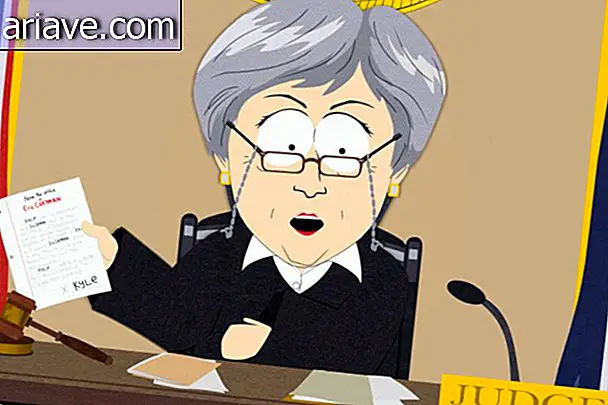What is the difference between Dark Web and Deep Web?
Criminals den? Low layers? Site full of viruses? These and other such and other descriptions have made Deep Web an extremely complex and popular subject among many people around the world. But one thing is certain: Google doesn't know everything.
First, so that there is no future doubt as to our terms, today we will separate the internet into parts: Surface, Deep and Dark. There may be more, but understanding the concept of these three is enough to minimize confusion in the use of names.
What we can see: Surface Web
Everyone has heard the iceberg metaphor: a small part can be seen by everyone, while more than half is hidden underwater. With the internet, it's pretty much the same thing.

Surface Web - the surface, in Portuguese - is all part of the indexed internet, enabling search engines (Google, Bing, and others) to find the domain, and all audiences have free access to the information posted there - unless you need a login or password, of course.
Most scholars on the subject claim that Surface Web accounts for only 4% of all information on the Internet. So you who accessed this story are browsing it. No big risks, no need to worry!
What is hidden: Deep Web
From now on, we begin to address what lies beneath what we can see. Many people find that on the Deep Web we only find disturbing and criminal information, being a den of criminals on the Internet. Exist? Yes. But it's not quite like that.
Unlike Surface Web, Deep is made up of unindexed sites, so you can't find them on search channels like Google. What does that mean? That information present there can only be accessed if you really wish. So, the famous maxim goes: those who seek find!
It can be said that Deep Web has a part that is under our noses and we just don't know why we don't use special lenses to see them (ie we don't know their addresses). But there are also those that are a little deeper.

Those who access this part of the Deep Web, in most cases, use encrypted networks that hide their identity, such as Tor, i2p, and FreeNet. These software works like the most famous browsers (Chrome, Firefox, Edge, among others), but with the difference that IP information and user data are hidden by them. But calm down, we'll explain later how they work.
It's very important to mention: The sites registered here use slightly different servers than we are used to. For starters, the “.tor” domains are completely independent of ICANN - which is the body responsible for pointing to the whole world which DNS is each top level domain.
Most people who access the Deep Web don't seek to get involved in illegal situations, just don't want to be found. There is all sorts of information, good - very good - and bad - really bad. This lets the user know what they want and where they are clicking.
The one that should not be mentioned: Dark Web
Now we come to the part responsible for most of the Deep Web myths. The Dark Web is where we can find the information and situations that the good citizen prefers not to get involved with.
In the dark area of the internet, encryption is extremely complex, allowing only advanced users - or "lucky" onlookers - to get to it. Most of your domains make no sense, being full of random letters and numbers.

Then we return to the hidden networks: Tor; i2p and FreeNet. According to some research, the biggest one is Tor.
Without nomenclatures that only make understanding of the subject even more difficult, here is a quick summary:
• First level: common internet, accessible to anyone and indexed by search engines;
• Second level: ordinary internet, which can be accessed by anyone but not indexed by search engines;
• Third level: restricted internet, which requires the proxy change to be accessed;
• Fourth level: more restricted internet, which requires the use of browsers with access distribution (.Tor);
• Fifth level: “secret” (unconfirmed) internet, which requires hardware to be changed for communications to occur.
Tor
Tor - The Onion Router is a free software that creates a chain of open networks that allow users to browse the internet in a hidden way - encrypted -. The source of the program is a US-funded project that intended to use it to convey sensitive information.

Tor's public network is characterized by being “.onion”, unlike Surface, which uses “.com” most of the time. It works like this: When the user enters a domain - of any kind - the request goes through multiple servers, creating a large web, which makes tracking virtually impossible.
i2p and FreeNet
The other two most famous networks work similarly to Tor's. In the case of i2p, the protocol used to encrypt user information is in User Datagram Protocol (UDP) and NEESgrid Teleoperation Control Protocol (NTCP), unlike the most famous., which uses Transmission Control Protocol (TCP) and UDP.
The i2p network is faster than Tor and is considered by many to be more secure.

FreeNet, on the other hand, is very different from others, since it does not use any proxy, but rather an information sharing network, which makes the data automatically encrypted. This network is famous for being considered “clean” because it allows the user to safely release data.
After all, what is the difference?
Finally, we come to the conclusion of the big question. The difference between Dark and Deep Web is that one is part of the other. Deep Web is made up of every unindexed domain - not found in regular search engines. Already the Dark Web is a small part of the Deep Web, where crime can occur and sharing illegal situations and information, such as drug marketing, dealing with hackers and killers, child pornography and other crimes.

Then we enter another controversy: how is the payment of these things made? The answer is complicated, but it revolves around Bitcoins - and currently other hard-to-track currencies. But that is a subject for another conversation.
.......
Remember that this article is not intended to teach, promote or convince any reader to try to enter the Deep or Dark Web, but to elucidate the differences and try to demystify some stories about them. But one thing is common sense: the internet is gigantic and we will hardly know it completely.
What is the difference between Dark Web and Deep Web? via TecMundo











